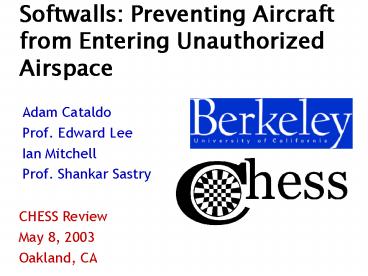Softwalls: Preventing Aircraft from Entering Unauthorized Airspace PowerPoint PPT Presentation
1 / 32
Title: Softwalls: Preventing Aircraft from Entering Unauthorized Airspace
1
Softwalls Preventing Aircraft from Entering
Unauthorized Airspace
- Adam Cataldo
- Prof. Edward Lee
- Ian Mitchell
- Prof. Shankar Sastry
CHESS Review May 8, 2003 Oakland, CA
2
Outline
- Introduction to Softwalls
- Objections
- Control system progress
- Future challenges
- Conclusions
3
IntroductionAvionics Application
- On-board database with no-fly-zones
- Enforce no-fly zones using on-board avionics
- Non-networked, non-hackable
4
Autonomous control
Pilot
Aircraft
Autonomous controller
5
Softwalls is not autonomous control
Pilot
Aircraft
bias pilot control
Softwalls
6
Relation to Unmanned Aircraft
- Not an unmanned strategy
- pilot authority
- Collision avoidance
7
A deadly weapon?
- Project started September 11, 2001
8
Design Objectives
Maximize Pilot Authority!
9
Unsaturated Control
Pilot lets off controls
Pilot tries to fly into no-fly zone
Pilot turns away from no-fly zone
No-fly zone
Control applied
10
Objections
- Reducing pilot control is dangerous
- reduces ability to respond to emergencies
11
There is No Emergency That Justifies Landing Here
12
Objections
- Reducing pilot control is dangerous
- reduces ability to respond to emergencies
- There is no override
- switch in the cockpit
13
Hardwall
14
Objections
- Reducing pilot control is dangerous
- reduces ability to respond to emergencies
- There is no override
- switch in the cockpit
- Localization technology could fail
- GPS can be jammed
15
Localization Backup
- Inertial navigation
- Integrator drift limits accuracy range
16
Objections
- Reducing pilot control is dangerous
- reduces ability to respond to emergencies
- There is no override
- switch in the cockpit
- Localization technology could fail
- GPS can be jammed
- Deployment could be costly
- Software certification? Retrofit older aircraft?
17
Deployment
- Fly-by-wire aircraft
- a software change
- Older aircraft
- autopilot level
- Phase in
- prioritize airports
18
Objections
- Reducing pilot control is dangerous
- reduces ability to respond to emergencies
- There is no override
- switch in the cockpit
- Localization technology could fail
- GPS can be jammed
- Deployment could be costly
- how to retrofit older aircraft?
- Complexity
- software certification
19
Not Like Air Traffic Control
- Much Simpler
- No need for air traffic controller certification
20
Objections
- Reducing pilot control is dangerous
- reduces ability to respond to emergencies
- There is no override
- switch in the cockpit
- Localization technology could fail
- GPS can be jammed
- Deployment could be costly
- how to retrofit older aircraft?
- Deployment could take too long
- software certification
- Fully automatic flight control is possible
- throw a switch on the ground, take over plane
21
Potential Problems with Ground Control
- Human-in-the-loop delay on the ground
- authorization for takeover
- delay recognizing the threat
- Security problem on the ground
- hijacking from the ground?
- takeover of entire fleet at once?
- coup detat?
- Requires radio communication
- hackable
- jammable
22
Heres How It Works
23
Reachable Set
set of all points reachable with some control
input
reachable set
starting at a point in the state space
24
Backwards Reachable Set
set of all states that can reach the final point
for some control input
backwards reachable set
given a final point in the state space
25
Backwards Reachable Set
Backwards reachable set
No-fly zone
States that can reach the no-fly zone when
control is applied
Can prevent aircraft from entering no-fly zone
Safe States
26
Implicit Surface Functions
implicit surface function for no-fly zone
implicit surface function for backwards reachable
set
No-fly zone
Backwards Reachable Set
27
Analytic Solution
- Hamilton-Jacobi-Isaacs PDE
backwards reachable set implicit surface function
no-fly zone implicit surface function
- Evans Souganidis--1984
- v
dynamics
28
Control from Implicit Surface Function
Control decreases to zero
Safe States
Safe States
Control at boundary
Backwards Reachable Set
29
Numerical Solution
- Mitchell--2001
computations storage
1
2
3
4
states
30
Get Real
- Control algorithm
- model predictive control
Richard Murray DARPA SEC Program Software Enabled
Control
31
Conclusions
- Embedded control system challenge
- Control theory identified
- Future implementation challenges identified
32
Acknowledgements
- Iman Ahmadi
- Zhongning Chen
- Xiaojun Liu
- Steve Neuendorffer
- Claire Tomlin

